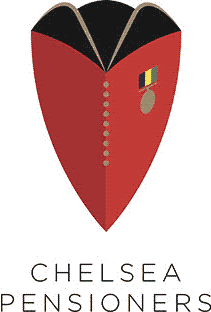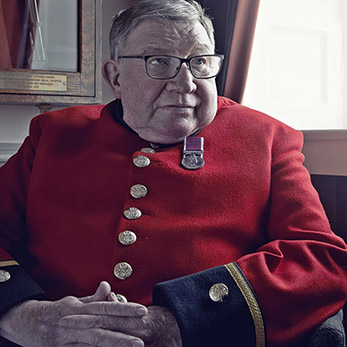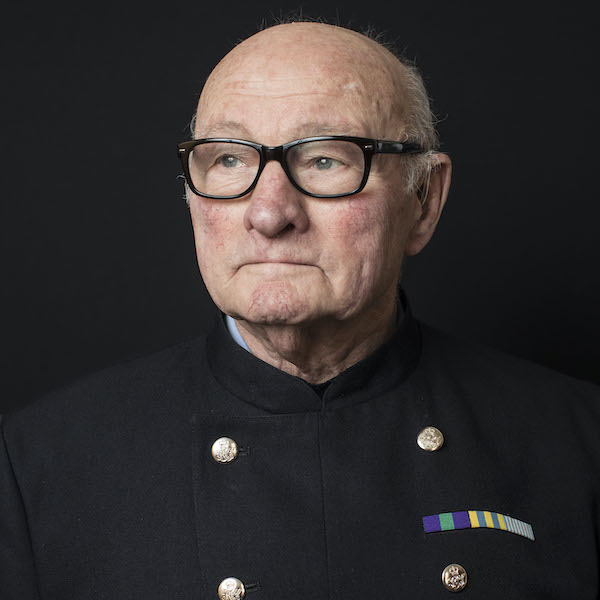Pensioner Bill Rowlinson looks back on an action-packed career
With experience in the Merchant Navy, Army and RAF, as well as the police, Bill Rowlinson had a varied and exciting career before becoming a Chelsea Pensioner. Here he shares some of the highlights of his life and tells us what motivated him to make the Royal Hospital his home.
From Commando comics to Cunard
My family were in the Merchant Navy from way back. My great uncle was a Commodore of the White Star Line, which included the Titanic, and my father was a Trinity House pilot. He wanted me to go to sea too, so I joined HMS Worcester in 1966 as a Royal Naval Reserve cadet. I left after three years on a ship and my father asked what I wanted to do. “I want to join the Army and become a paratrooper” I said. I’d always wanted to join the Army. I’d grown up with Victor, Valiant and Commando comics and both my uncles were in the Territorial Army.
My father said he’d invested in my education so I would go to sea and I should give it a go. So I joined Cunard and did seven years, ending up as third mate. Then Cunard was taken over and they asset-stripped the company. I told my dad that there wasn’t enough work at sea anymore, so I was going to join the Army. Both my uncles were in the Territorial Army so I’d grown up with their stories. My grandfather had been in World War I and wouldn’t let any of his children join the infantry, because of the dangers, so my father insisted I needed a trade.
Best recruit and able seaman
I went to the recruiting office and they said that as I was a navigating officer I should join the maritime regiment of the Royal Corps of Transport. So I went down to Buller Barracks – one of the other Chelsea Pensioners was also in my intake – joined the Royal Corps of Transport and passed out as best recruit.
I was put through my B2 and B3 course all at once, came out as a B2 and went aboard Her Majesty’s vessel Audmer as an able seaman. We went to the Outer Hebrides where we were responsible for logistics and resupply - resupplying the Royal Artillery range, the St Kilda tracking station and the rocket firing range at Benebecula. At Benbecula, we’d fire surface to air missiles for shooting down aircraft and surface to surface missiles, which were atomic. Then in 1977 we did the Jubilee review of the fleet.
After I signed off that ship I was posted to regimental HQ for a while. Then they wanted some people to go out to the British Kiel Yacht Club as part of the safety boat and I got posted there in the summer of 1978. The Kiel Yacht club does sail training for the Army and every Wednesday we’d get a bunch of school teachers and squaddies coming to learn to sail. They’d take the boat over and after a little time learning to sail around Kiel we’d go to Denmark and have a weekend sailing around there before coming back and cleaning the boat. Then we’d do the same the next weekend. It was lovely.
“Dull it isn’t”
After that I was sent back to St Kilda and then Benbecula, where we ran the safety boat. While I was there, I met a guy who was a para in the Royal Signals and I told him I wanted to join the parachute regiment. I’d signed off and was seeing out my last 18 months so he said, “Why don’t you join the Territorial Army?” So the day after I was demobbed I joined the parachute regiment of the TA in London. Unfortunately, I got injured doing the assault course during basic training, so I came out and got myself a job in civvy street for a couple of years. Then I joined 215 squadron, Royal Corps of Transport, Territorial Army and went on Crusader with them.
After I returned from Crusader, I was working in an office cold calling businesses. We had the radio on in the office and one day I heard an ad with lots of sirens and dogs barking. The ad said, “Metropolitan Police – dull it isn’t.” I looked around my office and thought, “Dull it is”! So I popped into East Ham police station and picked up a recruitment card.
I joined the Met in March 1981, based at Peckham police station. The Brixton riots were going on and before I’d even started my first shift there was a knock on my door. “Get your uniform lad” the house warden told me, “You’re on stand-by”.
When I turned up at the police station there were flames licking up the side from petrol bombs. Special constables were manning the front desk, the gun cabinet was open with the guns loaded and all the radios were in a bucket in the yard with a can of petrol ready to burn them if the nick was over-run. I grabbed a radio and was out clearing the street and arresting people.
The Commissioner’s Cavalry
One night I saw an armed robber being arrested. The firearms unit turned up in an armoured land rover, with shotguns and rifles and surrounded the house. I decided that what I wanted was to be a D11 firearms instructor. It went back to those comics I loved – they were known as the Commissioner’s Cavalry. Sometime later I did my firearms course and passed out as best student and top shot. My assessment included giving a lecture however, which I’d never done before and I wasn’t any good at it, so I wasn’t deemed suitable.
My mate had just gone into the Diplomatic Protection Group and, as I was already firearms trained, he suggested I join them. While I was there, they formed a three-level team. I was level 2 – plain clothes and uniform jobs. I worked with the flying squad and surveillance teams, doing firearms operations and training to be a firearms instructor – they were some of the best years of my life.
Firearms training for overseas police
When I joined the police, I went back to the TA. I ended up as a private in the Military Police in Brixton and was there from 1984. At the end of 1995, 48 of us were sent to Bosnia – I was a staff sergeant by then. I ran the ops room and then became the head watch keeper. I was there with Tina Kilnan who is now the Royal Hospital’s heritage manager.
After six months I came back to the firearms unit and continued as an instructor until 2000. I was 48 then and hit my age rank band, so it was time to go. It was just as well, because the foreign office was looking for police officer instructors to go to Bosnia as part of the UN commitment. I didn’t get sent to Bosnia, but was called and asked to go to Kosovo for a year. I was working for the Organisation for Security and Cooperation in Europe (OSCE) as a police firearms instructor for the new Kosovo police force.
I came back and my old TA unit said I could go to the Royal Military Police cadet unit in Wandsworth. I got my commission there with the cadets and commanded the unit. Then 9/11 happened and we had a lot of work in the police, so I had to leave the cadets. I was sent to Jordan for a year to train the Iraqi police.
On my return, a mate of mine who was in the Royal Airforce police unit auxiliary asked why I didn’t join them. I thought I was too old, but he said they recruited up to 55 and you could soldier on until 60. So I joined them and within six months I was sent to Macedonia and worked for the brigadier as part of the NATO HQ security – it was an international unit with Macedonians, Americans, French and Germans reporting to a Polish sergeant. Afterwards, I was sent to Afghanistan in 2010 – and then at 60 I got too old and had to leave.
When I retired from the police in 2009, I got approached by the City of London police. I’m an inspector of the special constables now and organise their trooping of the colour.
A thrill seeker
Over the course of my career, I was in the regular Army, the TA, the Royal Navy and the RAF. I had a fabulous time in the Army – it feels like being part of a family – and I made lifetime friends in the TA. My proudest achievements include passing out as best recruit, getting a recommendation to warrant officer and spending time with the parachute regiment – that was Boy’s Own stuff!
There have been dangerous moments – like being in a flat-bottomed tank landing craft in a Force 8 or 9 gale going to St Kilda and being rocketed when I was in Afghanistan. Maybe I’m a bit of a thrill seeker!
“It’s a community here”
I decided to become a Chelsea Pensioner during lockdown. I was living on my own and one day I slipped in the bath. I was fine, but it made me wonder what would have happened if I’d fallen over and broken my hip. I’d seen enough “sudden deaths” as a policeman and didn’t want to end up like that. I had lots of retirement plans but when Covid happened I was in the flat on my own and it was quite lonely. So I thought, “I”ll go to the Royal Hospital – there will be people around all the time, with similar backgrounds, and they’ll look after me.” The medical care we get is fantastic - I cannot praise it enough.
It’s a community here. I’ve met people I knew when I was serving and I’ve made new friends. I’m learning how to pace stick and went out for the first time in my Scarlet recently with another Pensioner who was also in the Merchant Navy. I look forward to getting involved in more things. You only live once – it’s not a rehearsal. You’ve got to grasp things and that’s what I plan to do at the Royal Hospital.






